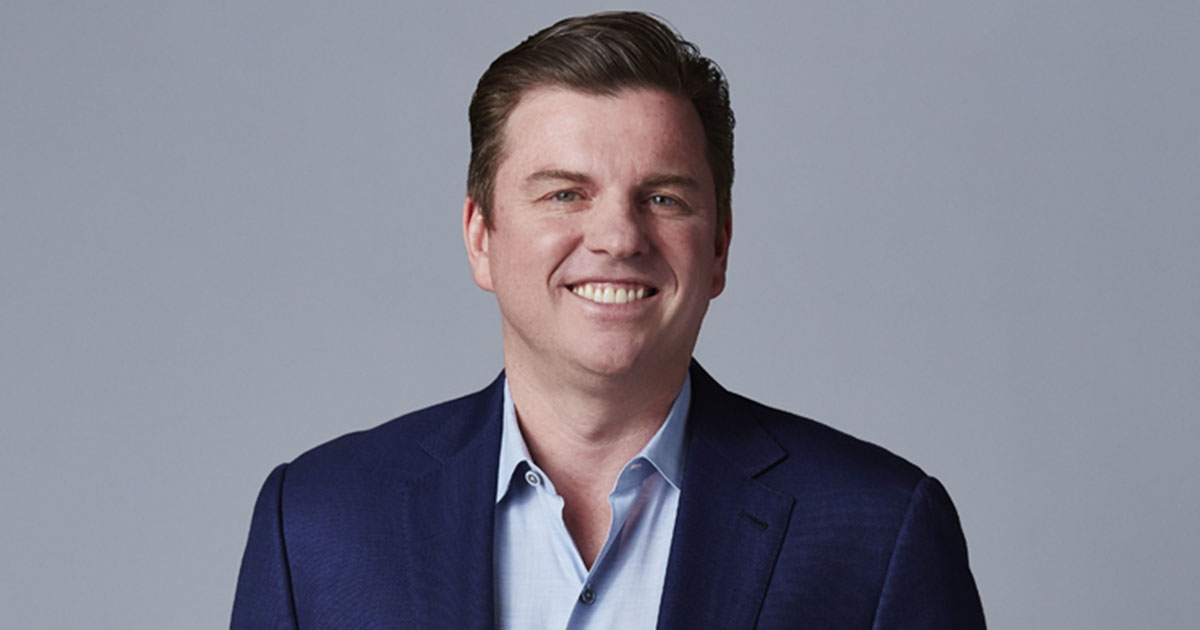Tony Bates Is Showing Companies of All Sizes the Benefits of Leading With Empathy
Tony Bates is challenging the widespread belief of most companies that they have very good relationships with their employees and customers.

Tony Bates, CEO of Genesys, Shows Clients They Can Enhance Relationships With Employees and Customers Through Empathy
Tony Bates, CEO and chairman of privately-held Genesys, which orchestrates cloud-based experiences to connect businesses to customers and employees more deeply, says that most companies are deluding themselves into believing they have a good relationship with both.
In “Empathy in Action: How to Deliver Great Customer Service at Scale,” he and co-author Dr. Natalie Petouhoff, the company's senior customer experience strategist, point to a huge gap between management and both groups.
A Bain & Co. study found that while 80% of companies claimed to provide good customer experiences, only 8% of customers agreed. And while 71% of executives say employee engagement with their work is critical to success and to avoid expensive turnover, Gallup reports 70% of the workforce is disengaged.
The good news is that researchers found that enterprises that make customers and employees their true top priorities, rather focusing only on quarterly growth metrics, see a 92% increase in customer loyalty, an 84% rise in revenue, and a 79% margin in costs saved.
And Bates takes his own medicine. When he took the helm in May 2019, the company that is based in Daly City, Calif., had recently reported annual revenues of $1.5 billion, powered by 5,000 employees. For the fiscal year ending January 31, 2022 it reached over $1.9 billion, with a global workforce of 6,000. Genesys also made Forbes' list of America's Best Midsize Employers for 2022.
Develop Technical And Interpersonal Skills To Succeed
Bates, 55, grew up in West London, his mother a hairdresser and father a builder. After one year of college studying mechanical engineering, he dropped out and went to work at the University of London as a computer network operator in 1986.
He taught himself coding by reading manuals during the two-hour commute by train and worked on projects to connect British and American universities through the gateways of the US Defense Department's Advanced Research Projects Agency Networks (ARPANET). In 1994, Bates joined telecom giant MCI, Inc., in Virginia to develop the largest Internet based on the recently invented World Wide Web to make it easy to access information and communicate.
Moving to California two years later, he rose in the ranks at CISCO Systems Inc. over the next 14 years, including heading the team that designed the groundbreaking CRS-1 router and serving as vice president and general manager of the small business, commercial, and enterprise divisions. Focused on infrastructure issues, he did not really understand the user's point of view until he was tasked to smooth out the troubled integration of Scientific Atlanta, which made set-top boxes that enabled cable companies to offer high-speed Net service. The prior 100 acquisitions had gone smoothly.
"Empathy helped me understand the conflicts between the two cultures and this was my introduction to the consumer market," Bates wrote. "You can't be successful if you don't understand the differences and learn to harmonize them, rather than expecting the acquired company to completely change."
Once the problems were straightened out, the home video business was developed, and nearly 300 million set-top boxes were placed in more than 100 countries.
Bates said that listening closely to understand other points of view and having mentors have been keys to his success. "Growing up in humble beginnings and getting to know a wide variety of people also helped me develop intuition about others that I call my superpower."
Envision the Future, Then Create It
Bates started using Skype in 2004 and considered it one of his favorite technologies when he was named that company's CEO in October 2010 after he left Cisco. He understood and respected its culture. Skype was then primarily used for making video calls and recreation, with only 6.5% of its users making calls from their computers to landlines or mobile phones. Seeing the blurring of consumer and business worlds, he planned to monetize premium services for videoconferencing, call waiting, and answering services.
Skype was acquired for $8.5 billion by Microsoft in May 2011, when active users had reached 170 million. As president of the Skype division, he integrated it with the major Microsoft products, such as Internet Explorer, Bing, Windows 8, and Outlook, as well as launching products for teachers and small businesses. By the time he left in 2013, its connected users had topped 300 million.
"But I didn't learn from success alone," Bates wrote. "We were late to mobile with Skype. When I became president of GoPro, the maker of action cameras, mobile apps, and video-editing software, in June 2014, we didn't evolve from a product company to a platform."
He left GoPro two years later. Genesys was "a once-in-a-lifetime chance to apply everything I've learned to transcend conventional thinking about the way business is conducted and provide the innovations that would help companies."
He recruited Petouhoff, whose mother was a teacher but died when she was 14, leaving her to help raise her three siblings. She eventually earned a Ph.D. in material science at the University of California Los Angeles after writing a thesis on high-energy particle physics and the materials that made spaceflight possible. "I was learning to look at root causes and solve problems in new ways, using critical thinking," she wrote.
She became a management consultant and was sometimes appalled at the shortsighted decisions executives made. But at hundreds of other companies, she was able to help implement organizational and technological changes that would enable them to leap ahead of competitors.
The Age of Empathy
The Fourth Industrial Revolution emphasized efficiency and cost-cutting to meet quarterly shareholder expectations, with big companies confident that customers would remain loyal to their brands as long as the price was right. Now, tired of poor quality products and lousy service, customers can choose more satisfying alternatives with a tap of their phones.
The pandemic has also supercharged the stress, anxiety, and burnout of employees, leading to the Great Resignation (since even better pay cannot make up for being overworked and always available to deal with endless crises).
A Cornell University study found that 90% of contact center operators were feeling high or very high levels of stress. A Salesforce survey found that 71% of agents have been thinking about quitting their job, even leaving the industry entirely, since it is nearly impossible to satisfy customers without being empowered to solve problems that their employers seem to create daily.
Chatbots as substitutes for human connection are clearly unsatisfactory. Part of the solution needs to be to use artificial intelligence to match employees and customers to improve both their experiences, Bates and Petouhoff argue. This can enable leaders of any size organization to be part of the Fifth Industrial Revolution.
"The age of empathy is here and it is opening doors we never knew existed," they wrote. "The only question that remains is this: Are you and your business ready to embrace the changes to come? The transformation will be a deep, multi-level collaboration between people, machines, and awareness. Leaders need to create collaborative cultures where employees feel the psychological safety needed to embark on this new journey together to the extent they will go the extra mile to ensure each other's success. The culture cannot be one where feedback is seen as rejection. Instead, there has to be an openness to view things differently and help others see situations from different viewpoints."
The New Business Model
Comparing the way employees are treated under the dominant business-centric model now with the way they should be treated, companies value efficiency and sales conversion, while the employee experience (EX) that drives loyalty makes it easy to help customers, enjoy their work, and have a flexible schedule.
The new customer-centric experience (CX) should have these traits:
- A VIP one-to-one quality, personalized at scale.
- Address all relevant issues in real time.
- Help even before the customer knows there is a problem and offer answers before a question is asked.
- Show that the employee listened and understood, not require repeating information.
- Assistance continues until the problem is fixed and checking back to make sure it all worked out.
- Leave the customer feeling the company will keep data safe.
They note that the fundamental problem is that outdated corporate accounting practices focus on key performance metrics (KPIs) that average all customer experiences and measure them against the cost-cutting of average handle time (AHT) and first contact resolution (FCR), and so forth. "What if all experience metrics were designed to deliver customer loyalty?" they ask.
"We are at a turning point that calls for reimagining of the corporate model from the ground up," they wrote. "Few business schools and MBA programs include these concepts."
Fortunately for startups and small- to medium-sized companies, they are much closer to their customers and their workers, so they have a chance to deploy the ideas that big enterprises are ignoring or misusing because leaders are so far removed that they lack empathy for those they should be serving.
About the Author

Scott S. Smith has had over 2,000 articles and interviews published in nearly 200 media, including Los Angeles Magazine, American Airlines’ American Way, and Investor’s Business Daily. His interview subjects have included Bill Gates, Richard Branson, Meg Whitman, Reed Hastings, Howard Schultz, Larry Ellison, Kathy Ireland, and Quincy Jones.
Startup Resources
- Learn more about Startups
- Visit the TRUiC Business Name Generator
- Check out the TRUiC Logo Maker
- Read our Business Formation Services Review
- Find Startup Ideas
- Explore Business Resources
Form Your Startup
Ready to formally establish your startup? Click below to read our review of the best business formation services!
Best Business Formation Services